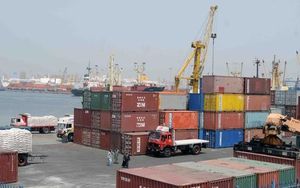Speculation is swirling around the potential new Minister of Economics in the cabinet of Friedrich Merz, as conversations reportedly have already taken place regarding the appointment. According to a report from BILD, Merz considers a former CDU Bundestag member, Katharina Reiche, a top candidate for the role.
Reiche, who served in the Bundestag from 1998 to 2015 and was a deputy chair of the parliamentary group for four years, has extensive experience both in politics and the business sector. Following her political career, she transitioned to the private sector, becoming the CEO of Westenergie, one of the largest energy service providers in Western Germany. Additionally, she serves on the National Hydrogen Council, indicating her involvement in key energy policy discussions.
These developments come amid a broader restructuring of the Ministry of Economics, which will see significant changes under the expected black-red coalition government. The coalition agreement is still pending approval from both the CDU and SPD, with a finalized ministerial list expected by the end of April 2025.
Carsten Linnemann, the CDU Secretary General, has publicly stated that he is not interested in the Economics Minister position, which adds to the urgency for Merz to identify a suitable candidate. Initially, Jens Spahn was considered a strong contender for the role, but recent reports suggest he may instead take over as the leader of the Union faction in the Bundestag.
As the search for the new minister continues, several other names have emerged as potential candidates. These include Gitta Connemann, chairwoman of the Mittelstandsunion; Andreas Jung, an expert in energy and environmental issues; Reiner Haseloff, the Minister President of Saxony-Anhalt; Michael Kretschmer, the Minister President of Saxony; and Tanja Gönner, the head of the Federal Association of German Industry.
Each of these candidates brings unique qualifications and perspectives to the table. Connemann is noted for her expertise in economic policy and her ties to rural communities, while Jung has established a reputation as a climate policy advocate. Haseloff, with his background as a physicist and former economics minister, offers an extensive understanding of energy transition and industrial policy.
Meanwhile, Kretschmer's industry-oriented approach and Gönner's connections within the business community position them as formidable candidates as well.
The restructuring of the Ministry of Economics is part of a larger shift in governmental focus. The climate protection sector is expected to revert to the Ministry of the Environment, while space policy will transition to the Research Department. This leaves the Economics Ministry to concentrate on industry, small and medium-sized enterprises, and overall competitiveness.
Friedrich Merz has been vocal about his intent to create a cabinet that reflects both experience and a commitment to revitalizing Germany's economy. The potential nomination of Reiche as the first female Economics Minister would mark a significant step in this direction, combining her political acumen with her business insight.
However, Reiche's candidacy is not without controversy. In 2021, she faced backlash for her comments on same-sex marriage, where she stated that "our future lies in the hands of the family, not same-sex communities." Such remarks have sparked debate around her suitability for a prominent role in the new government.
Despite the challenges, Reiche's background and experience may make her an ideal candidate to navigate the complexities of Germany's economic landscape. As the country faces pressing issues such as energy transition and competitiveness, the new minister will need to balance the demands of various stakeholders while fostering a conducive environment for growth.
As Friedrich Merz continues his search for the right candidate to lead the Ministry of Economics, the political landscape remains dynamic. The final decision will likely reflect not only the coalition's priorities but also the broader societal values that the new government aims to uphold.
In summary, the appointment of a new Economics Minister is a critical moment for the incoming Merz government. With potential candidates like Katharina Reiche, the coalition is poised to make a significant impact on Germany's economic future.






